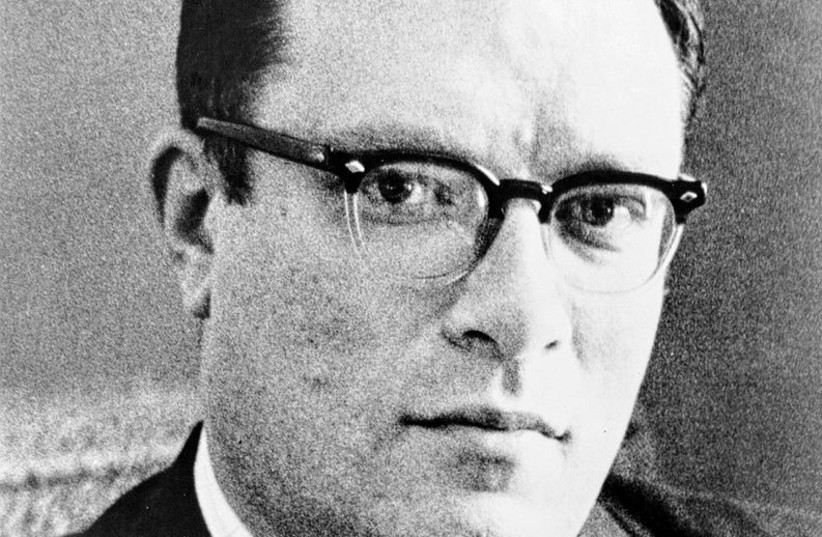Isaac Asimov is considered one of the greatest science fiction writers, and definitely the most famous of them all. He has written some of the most influential and popular books of the genre, which contained ideas, prophecies and quotes that appear in multiple references to this day. He has written and edited more than 500 books in different fields and was legendarily prolific as a writer. The American writer Harlan Ellison once commented about Asimov, “He had writer’s block once. It was the worst ten minutes of his life.”
Owing to his huge success as an author, it’s easy to forget that Asimov was also a scientist and a professor of biochemistry. Science was an integral part of his life and greatly influenced his stories. He worked extensively to make science accessible to the general public, wrote books and articles about popular science and technology, and even wrote a column in a children’s magazine. But there is certainly no doubt that he is known first and foremost for being a giant in the science fiction genre, and, as a tribute to this, an asteroid, as well as a crater on planet Mars, were named in his honor.
Isaac Asimov was born in 1920 in a Jewish family in a small town on the border between Russia and Belarus. Although he was brought up as a Jew and spoke Yiddish, religion did not play a significant role in his life. He did not believe in God, heaven or hell and identified himself as an atheist, humanist and rationalist. In fact, many of his stories contained a palpable aversion to religion.
He immigrated to New York with his family at the age of 3 and his parents opened a small candy and newspaper shop in Brooklyn. Much of his childhood was spent browsing the shelves of the store, discovering magazines about parallel universes, distant galaxies and amazing technologies far beyond imagination. He caught the science fiction bug and by age 17 he had already begun publishing his own stories.

<br>The Dawn of Nightfall
When he was 21, his story “Nightfall” became a huge success. The story, which deals with a surprising solar eclipse on a planet that had never experienced darkness, was, in the late ‘60s, chosen as the best science fiction story of all times, voted by the Science Fiction Writers of America.
Since then, Asimov wrote more and more books and book series, and won many awards and honorary titles. His writings remain popular to this day, and many web pages devoted to him and his works can be found today. His books deal with scientific and logical principles and their relation to questions regarding morality, faith and sociology. In most of his books, science is the key to the success and survival of the human race, but also a constant source of danger. In his books, Asimov dealt with deep philosophical questions and presented some technological predictions that have since become reality, such as advanced lighting techniques, flat screens and, to a certain extent, even smartphones. Who knows, perhaps what is to come in the future is also hidden in his prophecies.
Some of his books are based first and foremost on scientific principles. In the “Foundation” series, for which won the Hugo Award for the “Best All-Time Series” in the history of science fiction, he harnessed principles of statistical thermodynamics and applied them to mankind. The fictional science of “psychohistory” that he created for this purpose, ostensibly makes it possible to predict the course of history and even modify it, by treating large groups of humans as if they were gas particles devoid of free will. He argued thus that the actions of large groups of humans can be statistically anticipated, in spite of their utter unpredictability as single individuals.
Asimov’s science fiction dealt mostly with humanity, relating to both its strengths and faults, and its relationship with technology, especially robots. In contrast to his predecessors, who viewed intelligent robots as an existential threat to humanity, Asimov saw future technology as a positive force that could and should aid humans. In his book he articulated the three laws of robotics (which later became four) – defense measures that are programmed into each robot, to ensure that robots help humankind and not try to destroy it.
As befits a science fiction author, his death in 1992 was initially shrouded in mystery. It was only a decade later that the true cause of his death was revealed in an edition of his autobiography, written by his widow Janet. She divulged that he had died from complications of HIV, having contracted it in 1977, from a blood transfusion during heart surgery. Even after Asimov’s death, his intellectual legacy continues to inspire all who cherish his books.
Even after Asimov's death, his intellectual legacy continues to inspire anyone who takes his books to heart. If you would like to dive into the world of science fiction and tackle difficult and fascinating questions head-on, one can hardly think of a better way to do so than to begin this journey by delving into his writings.
